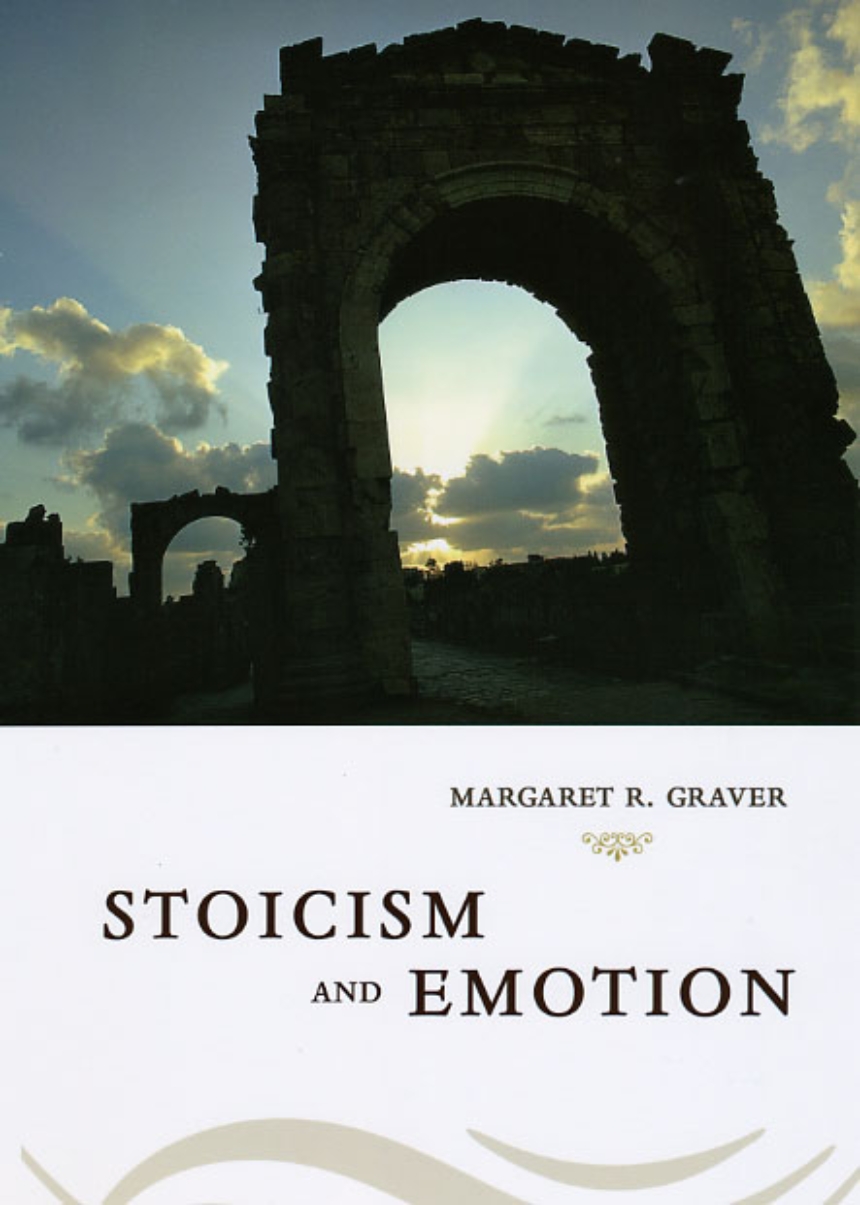Stoicism and Emotion
On the surface, stoicism and emotion seem like contradictory terms. Yet the Stoic philosophers of ancient Greece and Rome were deeply interested in the emotions, which they understood as complex judgments about what we regard as valuable in our surroundings. Stoicism and Emotion shows that they did not simply advocate an across-the-board suppression of feeling, as stoicism implies in today’s English, but instead conducted a searching examination of these powerful psychological responses, seeking to understand what attitude toward them expresses the deepest respect for human potential.
In this elegant and clearly written work, Margaret Graver gives a compelling new interpretation of the Stoic position. Drawing on a vast range of ancient sources, she argues that the chief demand of Stoic ethics is not that we should suppress or deny our feelings, but that we should perfect the rational mind at the core of every human being. Like all our judgments, the Stoics believed, our affective responses can be either true or false and right or wrong, and we must assume responsibility for them. Without glossing over the difficulties, Graver also shows how the Stoics dealt with those questions that seem to present problems for their theory: the physiological basis of affective responses, the phenomenon of being carried away by one’s emotions, the occurrence of involuntary feelings and the disordered behaviors of mental illness. Ultimately revealing the deeper motivations of Stoic philosophy, Stoicism and Emotion uncovers the sources of its broad appeal in the ancient world and illuminates its surprising relevance to our own.
In this elegant and clearly written work, Margaret Graver gives a compelling new interpretation of the Stoic position. Drawing on a vast range of ancient sources, she argues that the chief demand of Stoic ethics is not that we should suppress or deny our feelings, but that we should perfect the rational mind at the core of every human being. Like all our judgments, the Stoics believed, our affective responses can be either true or false and right or wrong, and we must assume responsibility for them. Without glossing over the difficulties, Graver also shows how the Stoics dealt with those questions that seem to present problems for their theory: the physiological basis of affective responses, the phenomenon of being carried away by one’s emotions, the occurrence of involuntary feelings and the disordered behaviors of mental illness. Ultimately revealing the deeper motivations of Stoic philosophy, Stoicism and Emotion uncovers the sources of its broad appeal in the ancient world and illuminates its surprising relevance to our own.
Reviews
Table of Contents
Acknowledgments
Introduction: Emotion and Norms for Emotion
1 A Science of the Mind
The Psychic Material
The Central Directive Faculty
Thought, Belief, and Action
Affective Events
2 The Pathetic Syllogism
Emotions and Ascriptions of Value
Appropriateness
Evaluations and Their Objects
The Stoic Ethical Stance
Eupathic Responses
Classification by Genus
Classification by Species
Some Remaining Questions
3 Vigor and Responsibility
Rollability
Overriding Impulses
Medea and Odysseus
Plato and Platonists
The Posidonian Objections
Freedom
4 Feelings without Assent
Beginnings and “Bitings” at Athens
The Senecan Account
“A Requirement of the Human Condition”
Alexandrian Propatheiai
A Stoic Essential
5 Brutishness and Insanity
Orestes and the Phantastikon
Melancholic Loss of Virtue
Fluttery Ignorance
Emotions as Causes
Brutishness
Seneca’s Three Movements
6 Traits of Character
Scalar Conditions of Mind
Fondnesses and Aversions
Proclivities
Habitudes of the Wise
7 The Development of Character
Empiricism and Corruption
The Twofold Cause
Cicero’s Hall of Mirrors
The Establishment of Traits
Autonomy and Luck
8 City of Friends and Lovers
Concern for Others
Proper Friendship and the Wise Community
Friendship and Self-Sufficiency
Optimistic Love
Ordinary Affections
9 The Tears of Alcibiades
Wisdom and Remorse
Strategies for Consolation
The Status of Premise 2
Progressor-Pain and Moral Shame
Apatheia Revisited
Appendix: The Status of Confidence in Stoic Classifications
List of Abbreviations
Notes
Bibliography
Index Locorum
Index
Introduction: Emotion and Norms for Emotion
1 A Science of the Mind
The Psychic Material
The Central Directive Faculty
Thought, Belief, and Action
Affective Events
2 The Pathetic Syllogism
Emotions and Ascriptions of Value
Appropriateness
Evaluations and Their Objects
The Stoic Ethical Stance
Eupathic Responses
Classification by Genus
Classification by Species
Some Remaining Questions
3 Vigor and Responsibility
Rollability
Overriding Impulses
Medea and Odysseus
Plato and Platonists
The Posidonian Objections
Freedom
4 Feelings without Assent
Beginnings and “Bitings” at Athens
The Senecan Account
“A Requirement of the Human Condition”
Alexandrian Propatheiai
A Stoic Essential
5 Brutishness and Insanity
Orestes and the Phantastikon
Melancholic Loss of Virtue
Fluttery Ignorance
Emotions as Causes
Brutishness
Seneca’s Three Movements
6 Traits of Character
Scalar Conditions of Mind
Fondnesses and Aversions
Proclivities
Habitudes of the Wise
7 The Development of Character
Empiricism and Corruption
The Twofold Cause
Cicero’s Hall of Mirrors
The Establishment of Traits
Autonomy and Luck
8 City of Friends and Lovers
Concern for Others
Proper Friendship and the Wise Community
Friendship and Self-Sufficiency
Optimistic Love
Ordinary Affections
9 The Tears of Alcibiades
Wisdom and Remorse
Strategies for Consolation
The Status of Premise 2
Progressor-Pain and Moral Shame
Apatheia Revisited
Appendix: The Status of Confidence in Stoic Classifications
List of Abbreviations
Notes
Bibliography
Index Locorum
Index
